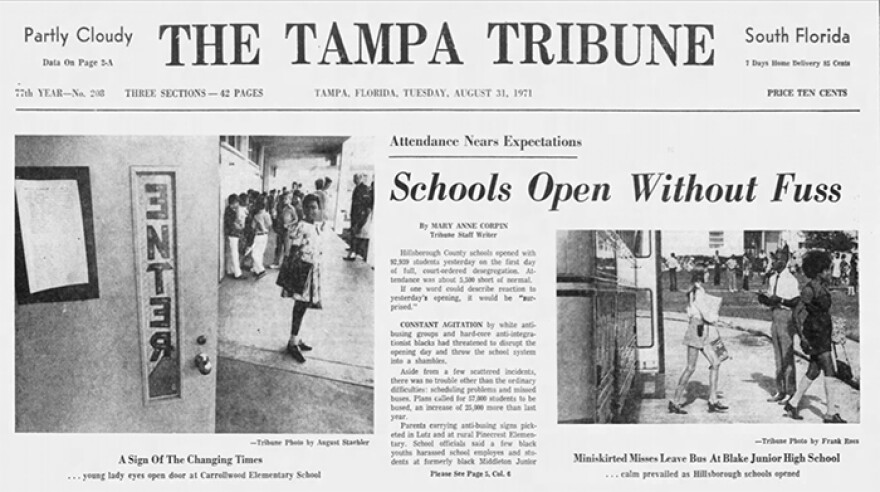On August 31, 1971, Hillsborough County opened the doors of their schools to all students, ending years of segregated classrooms.
That followed a Supreme Court ruling that upheld a court-ordered "busing for integration" plan in Charlotte, N.C.
The Tampa Bay History Center will mark the 50th anniversary Wednesday night. Florida Conversations will feature a number of local experts and advocates who will explain what happened when the racial barrier was breached and what has occurred since.
Civil rights leader and panel member, Imam Askia Muhammad Aquil, said the effect of desegregation was far-reaching at the time.
“There were a lot of disruptions that occurred, most of which people were not prepared for,” said Aquil. “Desegregation, for the most part, was fought out in the courts, but it impacted people in their daily lives, in their homes, and in their journeys from day to day, week to week, month to month back and forth from school.”
He added that while it impacted teachers and principals, it “completely changed” Black students.
“One of the certainly most disruptive aspects of desegregation and busing, as they called it, was you might not know from year to year which school you will be attending. Because if they had to reassign students to maintain that 80:20 ratio balance, then that's what happened,” said Aquil, referring to a 1971 court order that required junior high schools to have that percentage of white to Black students districtwide. Senior high schools were ordered to have 86:14 ratio balance; elementary schools were 79:21.
“You might be at one school this year, but in year two, be at a completely different school because they were trying to maintain these artificial numbers,” said Aquil. “And certainly, that was very disruptive that you couldn't look forward to being in certain clubs or organizations or playing on certain athletic teams with the coaches that you knew or other players that you know with whom you might have grown up.”
Another panelist, Barbara Shircliffe, is chair of the University of South Florida Department of Educational and Psychological Studies, and author of the book, “The Best of That World: Historically Black High Schools and the Crisis of Desegregation in a Southern Metropolis.”
“One of the things that Dr. Shircliffe goes into depth in her book is how most of the burden was on the shoulders of the Black students who were bused or segregated for most of their public school careers,” said Fred Hearns, the center’s Curator of Black History. “So for this to happen in one year between 1970 and 1971, you could imagine how traumatic it was and it was a crisis for Black and white students and parents.”
The discussion comes as debates rage over teaching some historical aspects of race. Hearns said that’s not the case with this event.
“What is history except an accounting of truth? That's all Black people are asking for. Let's just tell the truth,” said Hearns. “Let’s just look at history through the lens of what actually did happen, what has been documented.”
He added that discussions of topics like desegregation are necessary so people can learn from them and grow.
“We've got to learn how to live together and recognize that everybody has a story. And my story is going to be different from your story. But both of our stories are valid,” said Hearns. “And that's what we're looking at when we have these conversations.”
The event will be held on Zoom and in-person at the Tampa Bay History Center on Wednesday at 6:30 p.m.
You can register to attend by Zoom by clicking here, and in-person by clicking here.
WUSF is a media sponsor of this event.




